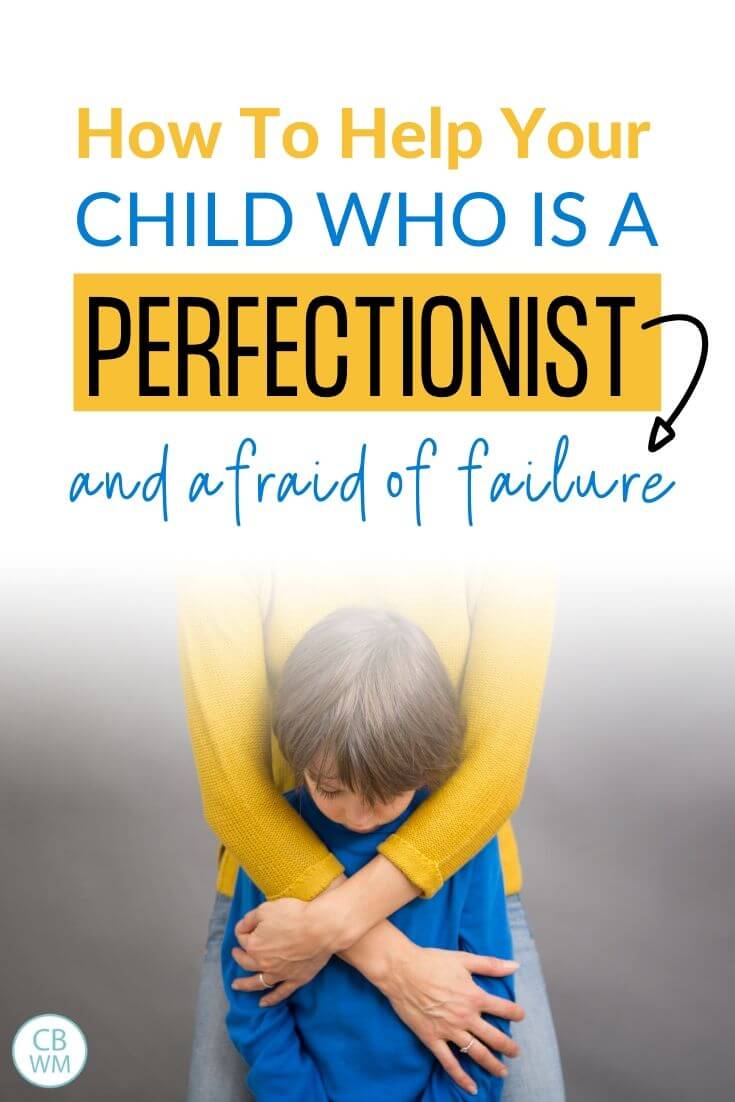Read up on how to help your perfectionist child overcome the difficult traits of perfectionism and use perfectionism as a strength rather than a weakness.

When Brayden was a young toddler, I taught him sign language for common words he wanted, or needed, to communicate.
One of those words was “help.”
I loved using sign language with him and used it with all of my babies, but was the only one I needed to teach to use the word “help.”
The reason he needed to know the word help was because he is such a strong perfectionist.
He couldn’t handle things not going perfectly, and before he knew the word help, he would melt into a frustration tantrum when things went wrong. Once he learned the word help, he could channel his energy and ask for help rather than throw the fit.
I very quickly recognized he was a perfectionist.
It wasn’t surprising. Many oldest children in a family are perfectionists. It is how we roll (I say “we” because I am also an oldest).
I am a perfectionist, as is my husband (who is a functional oldest child–he is the oldest boy in his family).
Post Contents
- What is a Perfectionist?
- Different Ways of Being a Perfectionist
- Is Being a Perfectionist Bad?
- Handling a Perfectionist Child
- Have a Phrase
- Sign Your Child Up for Hard Things
- Encourage, Encourage, Encourage
- Traits Your Perfectionist Child Needs to Develop
- How to Set Goals
- How to Accept Failure
- Grit
- How to Forgive
- How to Apologize
- To Be Satisfied with Best Effort
- How to Take Constructive Criticism
- To Accept Second, Third, or 100th Place
- To Be Intrinsicly Motivated
- How to Say No
- Optimism
- Conclusion
- Related Posts
What is a Perfectionist?
A perfectionist isn’t a one-size-fits all personality trait. There are common traits perfectionists tend to have, but not all perfectionists look the same.
In essence, a perfectionist wants to do the things she does perfectly–or without flaw. You expect yourself to perform tasks well and will be quite critical of yourself in your evaluations. Perfectionists tend to fear failure, get defensive when they are criticized, need to have control, and have high standards for self and others. (read more characteristics of perfectionism here)
Different Ways of Being a Perfectionist
With all of the millions of people in the world, it is no surprise that there is more than one way people react to their own perfectionism.
I noticed quite early on in our marriage that my husband and I were both perfectionists, but handled it differently.
My husband wanted to be perfect from the first moment he tried something. If he was not perfect the first time, he was extremely frustrated–to the point that he just wouldn’t do it again.
His mom tells the story of him as a young gradeschooler. He was drawing pictures in school and kept crumpling up the paper and throwing it away. Then he would start the same picture again. Upon inquiry, he expressed that he was frustrated because the picture on the paper didn’t match what the picture was in his mind.
My husband is actually a talented artist, but never really pursued it because his perfectionism prevented him from being willing to move past that non-perfect picture.
I am the type of perfectionist who wants to be perfect (just as much as the next perfectionist), but I am willing to get better over time. I recognize when things aren’t good enough yet and I will put in the time and effort necessary to get better. I very much accept a slow and steady pace toward improving on things in life.
There will certainly be more variations on perfectionism than these two.
Is Being a Perfectionist Bad?
Being a perfectionist can be a problem. I am in the camp that believes being a perfectionist can be a good thing, but I am certainly biased as I am a perfectionist myself.
There are many who believe being a perfectionist is a bad thing. Some, like Kevin Leman, encourage perfectionists to grow to become “excellence pursuers” instead (see Birth Order Book, page 117). I believe this is simply semantics. I believe there is a healthy way to be a perfectionist (one who pursues excellence) and an unhealthy way to be a perfectionist.
A perfectionist can easily become a person who gives up in life. Perfectionists often procrastinate tasks out of fear of failure. They will rarely finish tasks, because as soon as the task is finished, judgment can come down on the quality of the job. They beat themselves up. Many even beat others up and hold them to a very high standard. At the first sign of failure, they walk away and never try that task again. They can be inflexible and often lack trust for others.
Despite all of that, a perfectionist trait can be managed to become a great strength.
A perfectionist can be a person who keeps trying and continues to be a better version of themselves at all times. A perfectionist who is willing to try will be someone who is unstoppable. He will learn from past mistakes and improve upon them next time. They try their best every time. These are the movers and the shakers of the world who make a notable difference.

Handling a Perfectionist Child
I quickly realized that Brayden was like my husband in the perfectionism department. He wanted to be perfect so much that there were things he just wasn’t willing to even try because he wasn’t perfect the first time.
This is not a trait you can easily apply a few parenting tricks to and change things up. This is one of those situations where you are playing the long-game in parenting. You aren’t just trying to get your toddler to try to climb those steps again; you are trying to train your toddler to grow into a preschooler, tween, teen, and eventually adult who will be willing to try again.
Brayden, who is now 14, and I were recently discussing this trait and strategies I used to help him accept the need to practice and try in life. I started right from the toddler years, but it is possible to overcome this trait even as an adult. With recognition, a lot can be accomplished. My husband has made great strides in this area.
Have a Phrase
I am big on phrases. Have a phrase you say to your little one (or big one) when you see the frustration mounting. Encourage them to press on.
My phrase with Brayden was very simple.
“Keep trying!”
I said it very calmly and very positively. I also said it with neutrality. I didn’t want there to be pressure on his success. I wanted the focus to be on the “try.”
Sign Your Child Up for Hard Things
I knew Brayden needed something to be able to look back on in life and realize hard work and constant effort pay off over time.
I signed him up for two different activities in life to help him always be able to look at that.
The first was piano. I knew piano was something he would have to work at slowly over time for years. In reality, piano is something you can take lessons on for your entire life. There is always room for improvement. Many of the best piano teachers in our area take lessons themselves.
I knew piano would be something he could look back on someday and say, “I had to work hard for years to get good at that. I improved slowly, day by day.” I knew he could apply that same lesson to anything he faced in his life.
The second activity I signed him up for was swimming.
Swimming is another activity that you have to work at consistently, bit by bit. It is also an activity that you can always improve at. Even Olympians have coaches who help them get better. You learn slowly over time and building upon those skills. You improve technique, fitness, and speed over time. It can’t be done all in one chunk. It must be worked on very consistently year round.
These two activities are Brayden’s two favorite activities to this day.
There will be many things your child will have a very natural and easy aptitude for. It will be tempting to remove frustration from your child’s life and just sign him up for things he is really good at.
Don’t do that.
He needs to learn how to deal with frustration. He needs to learn the value of working at something over time. He needs to respect that improvement comes in increments over time.
That doesn’t mean he can’t also participate in things he is good at. But those things will not teach him the value of work.
With that, I will say Brayden has a natural aptitude for piano, but even with that, it is something he has to work at. So the thing you sign your child up for doesn’t have to be something where there is no natural talent nor interest. Just be sure the activity requires time and effort to improve.
Encourage, Encourage, Encourage
When your child gets discouraged, offer encouragement. Assure your child that it is normal to have to work at things. Think of things in your life you had to work at to get better. Share those experiences.
Be empathetic to the frustrations that come with failure. Do not dismiss your child’s feelings. “I know it is really hard to not do as well as you want to!” is better than “Don’t feel upset. You can’t always win.”
People need to know they are understood before they can move on from their emotions.
Help your child brainstorm ways to improve next time. What can be done differently? What needs to be worked on? Is it just a matter of more practice?
Express your confidence in your child. “I know you are a hard worker and I know that if you decide you really want to be better at this, you will find a way to do it.”
Traits Your Perfectionist Child Needs to Develop
Here are some traits your perfectionist child needs to learn to develop to learn to use the perfectionism as a positive trait rather than be debilitated by the negative side.
How to Set Goals
Children need to learn how to set goals. They need to practice the art of goal-setting and working toward those goals. Through this, they can learn how much they can take on at a time. They can learn how high to aim. Setting and attaining goals is a learned art.
For help on this topic, see my post How To Use a Vision Board to Help Kids Set Goals
How to Accept Failure
Life is full of failure. It just is. That is reality.
Perfectionists need to learn to accept that.
There is so much to learn from failure. If you will allow your failures to teach you, you will quickly learn wisdom and skill. You can improve on past mistakes.
After a disappointing loss in a soccer tournament, Kaitlyn (my second-born and functional oldest as the oldest daughter) was frustrated. She is like me in her perfectionism and tends to simply put her head down and work hard to improve. But some failure is harder to accept than others.
I wrote her a note on a sticky note that said, “Be proud of what you accomplished and use any disappointment as your motivation as you work.”
She kept that sticky note and it hands on the doorway to her closet in her room to this day.
One note. As the parent, you also have to accept failure. Be okay with your child not being the best, not being first, and not always being perfect.
Be okay with mistakes, forgetfulness, and even laziness. That doesn’t mean you do not teach your child to do better. It doesn’t mean consequences don’t apply. But you need to accept that mistakes (failure) will happen and need to be learned from. Read up on how to be an authoritative parent for more help in this area.
Grit
Perfectionists need to develop grit.
I don’t mean food.
Grit is when you are willing to keep at it. Keep working. Hold your passion and perseverance no matter what comes your way. Obstacles come. Sometimes it is failure, as we just discussed. Sometimes it is time, money, or simply that the difficulty is higher than expected.
Grit pushes you through despite any lack of talent and resources. You find a way to make it happen.
Without grit, kids will give up as soon as it is hard. And life is usually hard at some point. Perfectionists will give up as soon as imperfection shines through.
Through grit, you take potential and work to make it a real talent and real accomplishment.
How to Forgive
Perfectionists need to learn to forgive others. They so easily see flaws and mistakes in others.
They also need to learn to forgive themselves. They so easily see flaws and mistakes in themselves.
Help your child learn to forgive. Some children are naturally forgiving. Others need to be taught how to forgive. Some need to be walked through the process. Some need to be reminded they forgave for something and need to move on.
Forgiveness can be easier when we have a true love for others. See my tips on how to teach your child to love others here.
How to Apologize
It is much easier to forgive when you understand the sweetness of being forgiven.
Perfectionists feel ashamed of mistakes and are slow to apologize. They need to learn how to offer a real apology. They need to learn to admist mistakes, accept them, and to reconcile them.
Even accidental mistakes.
Read: Why We Require Apologies Even for Accidents
To Be Satisfied with Best Effort
A perfectionist wants perfection.
They don’t want “best” effort.
They want to be the best. Number one. Flawless. No mistakes.
Perfection is rarely a reality in this world.
Perfectionists need to learn to give themselves grace and recognize when they gave their very best.
When their very best was what they wanted it to be, or didn’t yield the results they hoped for, they can go back to goal setting and see what goals can be set to improve their personal best. But you cannot dwell in misery that something wasn’t better than you could possibly give.
How to Take Constructive Criticism
Perfectionists do not like to hear from others that they messed up.
Your child needs to learn humility. She needs to learn how to take criticism and get better.
As a child, your little one will be surrounded by constructive criticism. A teacher’s job is to help your child get better. A coach’s job is to help your child get better. To get better, you need to know what to improve on.
To accept this constructive criticism, your child needs to understand that it is acceptable and normal to not be perfect. That they will constantly, throughout their lives, need to improve upon themselves.
It will be helpful for your child if you show your areas of vulnerability, also. Help your child see that even adults need to improve. Apologize when you mess up. Share your goals with your children and how you want to get better at certain things.
Life is an endless journey of improvement.
To Accept Second, Third, or 100th Place
No one can get first every time in everything. This goes along with accepting best effort.
Your child needs to learn how to lose graciously.
This is part of the reason I hate the culture of “everyone gets a trophy.”
Losing at a competition, whether it be a sport, an art show, a science fair, or another competition, will help your child learn to deal with not being the best. It will help your child learn to develop grit. It will help your child learn to accept that she can’t always be the best.
To Be Intrinsicly Motivated
You will never please everyone. Even volunteers who are working for free with pure intentions get ripped apart from time to time.
We have to learn to work for ourselves. We have to accept we will always have critics. We have to learn to move past the negativity.
How to Say No
In an effort to be perfect, perfectionists often say yes to every request. They do not want to disappoint others. They do not want to be seen as weak or incapable.
We all know the burnout that can come from saying yes every time someone asks a favor of you. Sometimes we need to say no. Children need to develop that trait and learn it is okay at times.
Optimism
Optimism goes a long way toward helping a perfectionist in life. Looking at the future with optimism helps the perfectionist be willing to keep trying. Optimism helps the perfectionist look at failures and find the good in them.
If your child struggles with optimism, have him take a simple notebook and write down 3 things he is grateful for each night before bed (or first thing in the morning…whenever).
This simple act literally rewires the synapses in your child’s brain to look at the world in a more optimistic light.
Conclusion
Perfectionism, just as any other trait, can be used to do so much good in the world. This is a long-game for you as a parent. Spend time working on these traits. Fixing perfectionism won’t be a quick-fix. It takes time, but you can do it! And so can your child.
Related Posts

